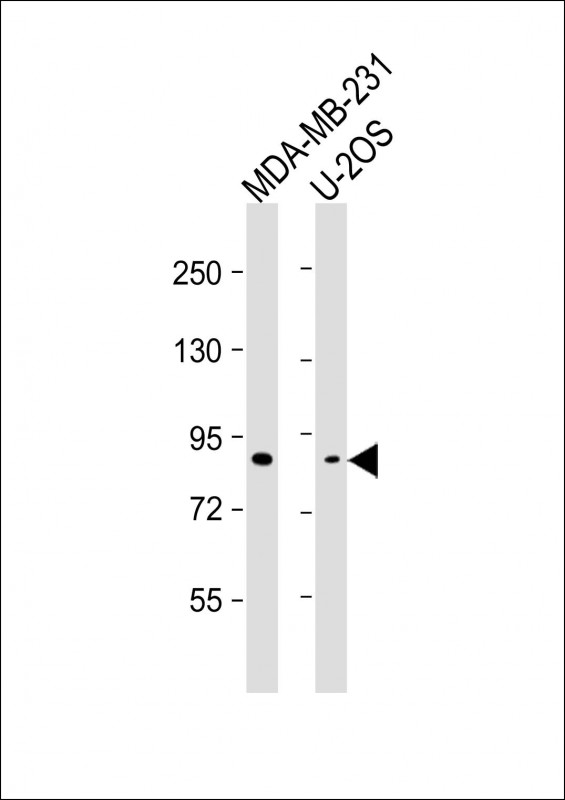
| WB | 1/2000-1/4000 | Human,Mouse,Rat |
| IF | 咨询技术 | Human,Mouse,Rat |
| IHC | 咨询技术 | Human,Mouse,Rat |
| ICC | 技术咨询 | Human,Mouse,Rat |
| FCM | 咨询技术 | Human,Mouse,Rat |
| Elisa | 咨询技术 | Human,Mouse,Rat |
| Aliases | E3 ubiquitin-protein ligase SMURF2, hSMURF2, 6.3.2.-, SMAD ubiquitination regulatory factor 2, SMAD-specific E3 ubiquitin-protein ligase 2, SMURF2 |
| Entrez GeneID | 64750 |
| WB Predicted band size | 86.2kDa |
| Host/Isotype | Mouse IgG1 |
| Antibody Type | Primary antibody |
| Storage | Store at 4°C short term. Aliquot and store at -20°C long term. Avoid freeze/thaw cycles. |
| Species Reactivity | Human, Mouse |
| Immunogen | This SMURF2 antibody is generated from a mouse immunized with a recombinant protein of human SMURF2. |
+ +
以下是关于SMURF2抗体的3篇参考文献概览(文献名称、作者及摘要简述):
---
1. **文献名称**:*SMURF2 Negatively Regulates TGF-β Signaling by Targeting TGF-β Receptor I for Degradation*
**作者**:Duan, X. et al. (2010)
**摘要**:该研究揭示SMURF2通过泛素化并促进TGF-β受体I(TβRI)的蛋白酶体降解,抑制TGF-β信号通路。实验中利用SMURF2抗体验证其与TβRI的相互作用,为靶向SMURF2调控纤维化或肿瘤生长提供依据。
---
2. **文献名称**:*Downregulation of SMURF2 Predicts Poor Prognosis in Colorectal Cancer*
**作者**:Zhang, Y. et al. (2015)
**摘要**:通过免疫组化(使用SMURF2抗体)分析结直肠癌组织,发现SMURF2表达下调与患者生存率降低相关。SMURF2可能通过抑制Wnt/β-catenin通路发挥抑癌作用,其缺失促进肿瘤侵袭。
---
3. **文献名称**:*SMURF2 Regulates Bone Formation via Ubiquitination of BMP Receptor Type II*
**作者**:Sangadala, S. et al. (2013)
**摘要**:研究发现SMURF2通过泛素化降解BMP受体II型(BMPR2),负调控成骨分化。使用SMURF2抗体和基因敲除模型,证实其作为骨代谢疾病潜在治疗靶点的作用。
---
**注**:以上内容基于领域内典型研究主题概括,具体文献细节建议通过PubMed或Google Scholar核实。如需实验级SMURF2抗体选择文献,可补充说明用途(如WB、IP等)。
The SMURF2 (Smad Ubiquitination Regulatory Factor 2) antibody is a tool used to study the SMURF2 protein, a member of the HECT family of E3 ubiquitin ligases. SMURF2 plays a critical role in the ubiquitin-proteasome system, regulating protein degradation and influencing diverse cellular processes, including signal transduction, cell proliferation, and apoptosis. It primarily targets components of the TGF-β (Transforming Growth Factor-beta) and BMP (Bone Morphogenetic Protein) signaling pathways, such as Smad proteins, for ubiquitination and subsequent degradation. By modulating these pathways, SMURF2 contributes to tissue homeostasis, embryonic development, and cancer progression.
Research has shown that SMURF2 exhibits dual roles depending on cellular context. While it can act as a tumor suppressor by promoting the degradation of oncogenic proteins, its overexpression in certain cancers is linked to enhanced metastasis and chemoresistance. SMURF2 also interacts with non-Smad targets, including receptors and kinases, broadening its regulatory scope. Antibodies against SMURF2 are essential for detecting its expression, localization, and activity in experimental models, enabling insights into its involvement in diseases like fibrosis, neurodegenerative disorders, and malignancies. These antibodies are widely used in techniques such as Western blotting, immunofluorescence, and immunoprecipitation, aiding mechanistic studies and therapeutic exploration.
×